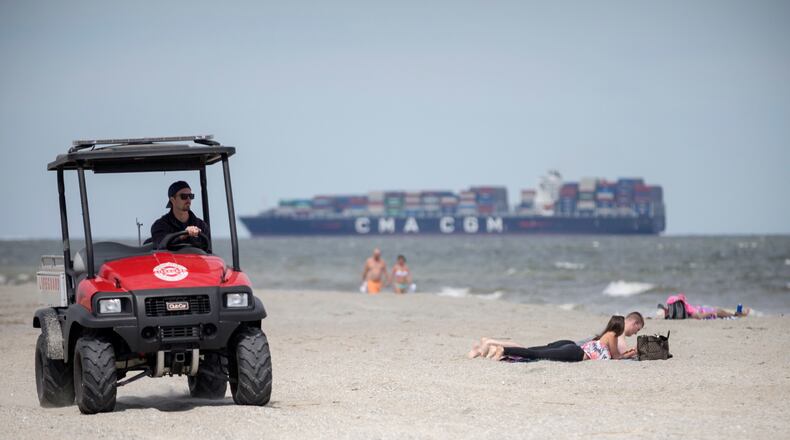It’s typically a relaxing beach scene on the northern stretches of Tybee Island, where the waves are often gentle and shells are plentiful.
Perhaps a dozen times a day, a towering cargo ship slips by on the way to or from Savannah and one of the nation’s busiest ports.
Then, sometimes, comes the danger. Tybee Island’s mayor describes it as a “mini tsunami.”
First, there’s a little ripple on the water’s surface that most wouldn’t notice. Next, the ocean water pulls back farther than normal. Then a wave swamps the beach with startling speed, rushing dozens of yards ashore, not too high, but still sometimes knocking over startled beachgoers, sweeping away beach chairs and cell phones.
A few times, says Tybee’s city manager, the deluge has pulled people out into the nearby shipping channel, where they had to be rescued by lifeguards on watercraft. “We have had some pretty scary situations,” said Shawn Gillen.
As Georgia’s biggest port hosts increasingly colossal ships, the surprise waves are confounding in their unpredictability.
A newly released study by the U.S. Army Corps of Engineers, conducted at the request of city officials, confirms that waves in the wake of cargo ships pose dangers on part of Tybee’s beaches.
Which ships will cause the problems remains a puzzle. The larger the ships and the faster they travel seem to be factors. But even really big, fast-moving ships aren’t guaranteed to cause a disturbance, according to the corps, which studied more than 1,500 cargo ships and tankers over a four-month period.
Potential fixes may have ripple effects, both for visitors on one of Georgia’s most popular beaches and for the port, a crucial economic magnet for the state.
“There is no easy solution here,” Gillen said.
Tybee officials say they don’t believe there have been any deaths tied to ships’ waves locally.
Still, “it’s a potentially life-threatening situation,” said Shirley Sessions, the mayor of Tybee, which has about 3,000 full-time residents but can have as many as 50,000 people in season.
Credit: Stephen B. Morton for The Atlanta Journal Constitution
Credit: Stephen B. Morton for The Atlanta Journal Constitution
Gillen and Sessions praised the port authority for taking the concerns seriously.
Only about a quarter mile of the island’s more than three miles of beaches is deeply affected by the surprise waves, particularly in an area north of the historic lighthouse.
For several years, Tybee has posted signs on the northern end warning beachgoers about potential danger from ship waves. City officials hope to increase the size of those signs in the coming months, but worry beachgoers still may miss or ignore them.
Tybee is about 12 miles east of Savannah and its northern end sits at the mouth of the Savannah River. Cargo vessels, some a quarter-mile long, travel the shipping channel less than a mile from the island. Cargo ships traveled up to 21 miles per hour, the corps found.
Reducing ship speeds was one of the recommended options from the corps study, but that would require coordination among the U.S. Coast Guard, the Georgia Ports Authority and other agencies.
The study listed other potential solutions needing further study, including refurbishing a jetty, which previously was projected to cost $53 million to $90 million, and installing a breakwater. It also said a warning system could alert beachgoers if sensors indicated a potential problem.
A spokesperson for the U.S. Coast Guard wrote in an email that the service is evaluating the corps’ study.
A spokesman for the Georgia Ports Authority said “more data is needed before determining which of (the corps’ recommendations) might prove most beneficial.”
In September, the ports’ executive director, Griff Lynch, pushed back against a separate federal proposal to restrict the speed of more vessels at certain times in certain areas to avoid striking endangered North Atlantic right whales. Lynch warned such changes ”would cause further interruptions to an already strained supply chain.”
About the Author
Keep Reading
The Latest
Featured




